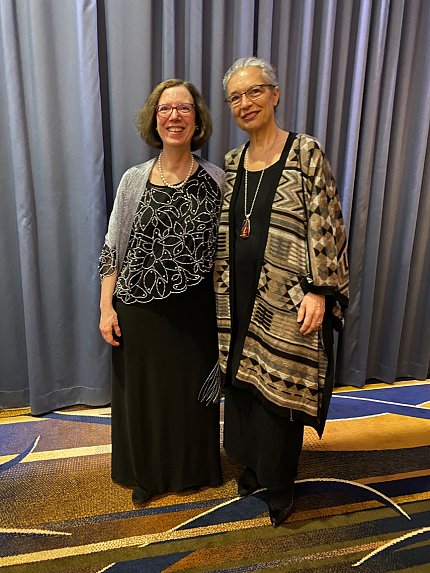NIEHS Scientist Honored for Contributions to Myositis Research

Photo: Bill Branson
Before the advent of recent treatments, the autoimmune muscle disease known as myositis was deadly. Of the patients who did survive, many were severely physically disabled.
Rare diseases like myositis are often challenging to study and treat because the smaller number of cases makes it difficult to draw scientific conclusions. However, Dr. Lisa Rider, a pediatric rheumatologist who leads the National Institute of Environmental Health Sciences (NIEHS) Environmental Autoimmunity Group, has been at the forefront of collaborations to identify genetic and environmental risk factors for myositis in children, classify patients’ symptoms, and uncover cellular markers of disease progression and treatment response. In addition, her work to measure how patients respond to treatment led to the successful development of the first Food and Drug Administration-licensed product to treat myositis in several decades.
Earlier this year, Rider was inducted into the Association of American Physicians during a ceremony in Chicago. Founded in the 1800s, AAP membership is limited to physician-scientists who have made impactful research contributions to advance biomedical science, medicine or health.
“Dr. Rider’s seminal research has substantially contributed to our understanding of how autoimmune muscle diseases develop, can be divided into mutually distinct phenotypes and how they are best assessed and treated,” the AAP wrote in announcing Rider’s selection.
“The fact that AAP is a national society and only has about 1,800 active members across the country and all disciplines of medicine—including pediatrics, surgery, OB-GYN, and psychiatry—is a real testament of the honor of becoming a new member,” said NIEHS Clinical Director Dr. Janet Hall. “It is highly competitive.”
A leader in diagnosing patients

Photo: Darryl Zeldin/NIEHS
Myositis, which occurs when the immune system goes awry and attacks healthy muscles and other tissues, affects approximately 75,000 people in the U.S. each year. Although the disease is considered rare, it may be underdiagnosed, with recent reports of some forms of myositis in children being mistaken for muscular dystrophy.
Although symptoms vary among patients with the disease, children with the most common form of myositis—known as juvenile dermatomyositis—often present with characteristic rashes on the eyelids or over the knuckles, elbows or knees. According to Rider, patients also can have photosensitive rashes, which are rashes brought on by exposure to sunlight. Muscle weakness close to the center of the body and in the shoulders or hip girdle is another common symptom.
Understanding how the disease presents differently and linking those symptoms to the presence of specific autoantibodies allowed Rider and her team to identify distinct subgroups of patients. Unlike antibodies generated by a healthy immune system to fight viruses, autoantibodies attack substances made by a person’s own body and are a hallmark of autoimmune diseases.

Thanks to Rider’s discovery of the anti-TIF1-gamma autoantibody, in collaboration with Dr. Ira Targoff and colleagues, clinicians around the world can now order blood tests to look for specific autoantibodies present in their patients. These autoantibodies can indicate whether a patient’s health outcomes will be more or less severe.
Rider with NIEHS collaborator Dr. Frederick Miller also created a national registry to pool patient data. They characterized participating patients across North America by demographics, environmental exposures, clinical features, responses to treatments and disease outcomes.
This scoring system is now widely used in clinics and endorsed by the American College of Rheumatology and European Alliance of Associations for Rheumatology.
Discoveries on the horizon
Rider’s research to assess gene and protein regulation in children and adults with dermatomyositis is helping to identify new pathways that may be targeted for therapy.
She recently received funding to evaluate how the levels of chemicals and other environmental exposures differ between identical twins and close-in-age same-gender siblings, specifically when one twin or sibling has an autoimmune disease and the other does not.
NIEHS Scientific Director Dr. Darryl Zeldin said, “Dr. Rider’s work is a wonderful example of our investment in physician-led science to transform understanding of a rare disease and translate that knowledge to improve patients’ lives.”
